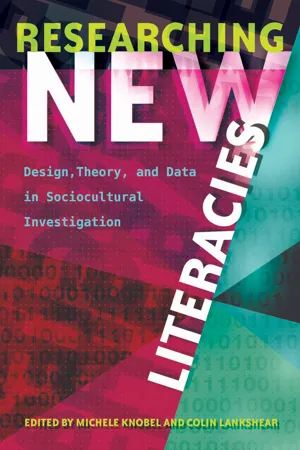
Researching New Literacies
Design, Theory, and Data in Sociocultural Investigation
- 254 pages
- English
- PDF
- Available on iOS & Android
Researching New Literacies
Design, Theory, and Data in Sociocultural Investigation
About this book
This book provides an expansive guide for designing and conducting robust qualitative research across a diverse range of purposes concerned with understanding new literacies in theory and in practice. It is based on the idea that one of the best ways of learning how to do good research is by closely following the approaches taken by excellent researchers. This volume brings together a group of internationally reputed qualitative researchers who have investigated new literacies from a sociocultural perspective. These contributors offer "under the hood" accounts of how they have adapted existing research approaches and, where appropriate, developed new ones to frame their research theoretically and conceptually, collected and analyzed their data, and discussed their analytic results in order to achieve their research purposes. Each chapter, based on a substantial and successful study undertaken by the researchers, addresses the research process from one or more of the following emphases: theory and design, data collection, and data analysis and interpretation. Core elements discussed in each chapter include research purposes and questions; theoretical and conceptual framing; data collection and analysis; research findings and implications; and limitations, glitches, and difficulties experienced in the research process.
Frequently asked questions
- Essential is ideal for learners and professionals who enjoy exploring a wide range of subjects. Access the Essential Library with 800,000+ trusted titles and best-sellers across business, personal growth, and the humanities. Includes unlimited reading time and Standard Read Aloud voice.
- Complete: Perfect for advanced learners and researchers needing full, unrestricted access. Unlock 1.4M+ books across hundreds of subjects, including academic and specialized titles. The Complete Plan also includes advanced features like Premium Read Aloud and Research Assistant.
Please note we cannot support devices running on iOS 13 and Android 7 or earlier. Learn more about using the app.
Information
Table of contents
- Cover
- Table of Contents
- Acknowledgments
- Chapter One: Researching New Literacies: Addressing the Challenges of Initial Research Training (Colin Lankshear / Michele Knobel)
- Chapter Two: Critical Junctures in the Design and Conduct of Affinity Space Research (Jayne C. Lammers)
- Chapter Three: Conversation Analysis, Transcription, and Local Productions of Order (Aaron Chia Yuan Hung)
- Chapter Four: Theorizing Context: A design-based analysis of an online affinity space (Alecia Marie Magnifico)
- Chapter Five: Understanding Twitter as a Networked Field Site: Implications for Research on Teacher Professional Learning (Jen Scott Curwood / Carly Biddolph)
- Chapter Six: The messiness of actor-network theory in an online gaming ethnography: The inside story of Leet Noobs (Mark Chen)
- Chapter Seven: Classroom digital literacies as interactional accomplishments (Ibrar Bhatt)
- Chapter Eight: Discourse analytic approaches to understanding literacies in online fan fiction writing communities (Rebecca W. Black)
- Chapter Nine: Games, films, and media literacy: Frameworks for multimodal analysis (Andrew Burn)
- Chapter Ten: Connecting content coding and Discourse analysis to investigate online affinity spaces (Sean C. Duncan)
- Chapter Eleven: “There’s a Relationship”: Negotiating Cell Phone Use in the High School Classroom (Anita S. Charles)
- Contributors
- Names Index
- Subject Index